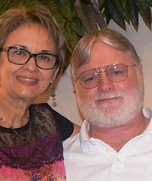At the Table
- Dennis Tutor
- Aug 4, 2025
- 3 min read

There's a strange story in the Old Testament that always mystified me. A certain enemy king of God's people had an unorthodox way of treating his vanquished enemies. He would cut off their thumbs and big toes, then have them scrabble for food at his table for the rest of their lives (Judges 1:1-7). Why did he treat his enemies in such an odd way? I got the "no thumbs—can't grasp weapons, no big toes—can't run away fast" bit, but the crumbs under the table? What was with that? After a lifetime of head-scratching, Dr. Oscar Brooks shed some light on this unusual course of action.
In short, "He was a cruel man, one who got his jollies from seeing his enemies scrabbling clumsily for mere morsels , the once powerful kings reduced to laugh-worthy spectacles." Ah, so that was it! This cruel Canaanite king, Adonibezek, got a kick out of seeing his once-powerful enemies reduced to laughing stocks. Now it made sense.
And then it hit me. This is what this ungodly earthly king did to his enemies. Doesn't the Bible say we were once enemies of God (Romans 5:10)? As His enemies, didn't we deserve horrible treatment just like Adonibezek's enemies? But behold the mercy and love of God, that although we are deserving of that same cruel and humiliating treatment—our thumbs and big toes cut off, scrabbling under the table for mere crumbs—our Lord and Savior has done just the opposite. He actually forgives us, and , not only that, but He extends His hand to us and says, "Come up here and sit at the table where I am." What a difference in treatment!
Just take a gander at these verses: "Thou preparest a table before me in the presence of mine enemies" (Psalm 23:5). "That ye may eat and drink at my table in my kingdom ..." (Luke 22:30). "Blessed are they which are called unto the marriage supper of the Lamb ..." (Revelation 19:9).
What a difference between what evil kings do and what our Holy King does! Talk about mind boggling heart awareness of His love! To think that our King, whose very essence is love, our King who is so holy and perfect and good that in ourselves we could never hope to attain to His level of glory, this wonderful King treats us not as we deserve, but with great unmerited kindness!
Ephesians 3:17-19 comes to mind: "That Christ may dwell in our hearts by faith; that ye, being rooted and grounded in love, may be able to comprehend with all saints what is the breadth, and length, and depth, and height; and to know the love of Christ, which passeth knowledge, that ye might be filled with all the fulness of God." To taste of His kindness is to step into the portal of His love.
As we meditate on this, His great kindness to us, His children, an act so diametrically opposed to what earthly kings would do to their enemies, we are filled with awe, and an overwhelming sense of appreciation. This then becomes a solid foundation on which Christ's love can begin to take root. Standing on this bedrock of unmerited forgiveness and blessing allows us to begin to take baby steps in understanding His love for us. And, in so doing, begin the process of being rooted and grounded in the fulness of God.
An erstwhile pastor of mine taught his congregation, of which I was one, that to promote spiritual growth, Ephesians 3:17-19 should be one of our go-to prayers. While for years I have obediently prayed so, the revelation of the contrast between Adonibezek's MO and God's dealt me such a blow that my heart awareness of His love grew exponentially in but a millisecond.
To see the meaning of what that mean old king did compared to what our good King does! To see that what we deserve is to be eating crumbs, scrabbling at His feet with our thumbs and big toes cut off, but instead have been clothed with robes of righteousness, and invited to His banqueting table, lifted up to a place of honor ... I have no words.
Unworthy that we are, in His forgiving love He actually honors us.
What greater love can there be than that we should be called—and treated as—the sons of God.
"Behold, what manner of love the Father hath bestowed upon us, that we should be called the sons of God ..." (1 John 3:1).




Comments